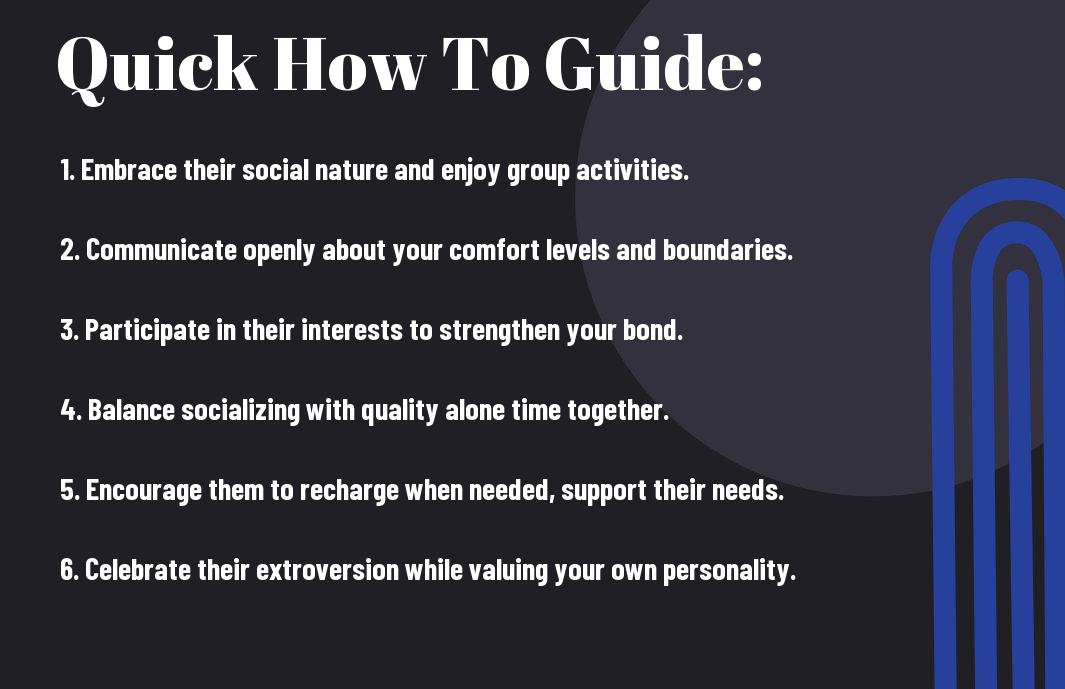Dating an extroverted partner can be a lively and exciting journey, as their vibrant energy can bring joy and adventure to your relationship. However, it may also come with challenges if you are more introverted or prefer quieter environments. Understanding their needs and finding a balance between your differences is imperative to building a harmonious connection. In this guide, you’ll explore practical strategies to effectively navigate the intricacies of dating someone with an extroverted personality, ensuring that both you and your partner thrive together.
Understanding Extroversion
As you navigate the world of dating an extrovert, it’s crucial to grasp the concept of extroversion. This personality trait largely defines how individuals interact with their social environment, often characterized by a preference for socializing, energetic engagement, and a vibrant presence in group settings. Understanding extroversion will help you connect with your partner on a deeper level.
Definition of Extroversion
Extroversion refers to a personality dimension characterized by sociability, talkativeness, and a preference for being around others. Extroverts typically gain energy from social interactions and feel most alive in bustling environments. Their outgoing nature often makes them the life of the party.
Common Traits of Extroverted Individuals
An extroverted individual often displays traits such as high energy levels, a tendency to seek out social gatherings, and a love for engaging in conversations with various people. They are generally assertive, approachable, and enthusiastic, which can make them quite attractive as partners.
Extroversion manifests in several distinguishing characteristics. You may notice that your extroverted partner thrives in group settings and actively seeks out opportunities to meet new people. Their strong communication skills and gregarious demeanor can draw others in, making socializing feel effortless. Additionally, extroverts may express their emotions openly, preferring lively discussions over quiet reflections, which can enhance your connection through shared experiences.


Communication Tips
Now that you’re navigating a relationship with an extroverted person, it’s vital to establish clear communication. Here are a few tips to enhance your connection:
- Be open about your feelings and preferences.
- Ask questions that encourage deeper conversations.
- Acknowledge their need for social interaction.
- Share your own boundaries in a respectful manner.
Any effort you put into understanding each other will enrich your relationship.
Active Listening Strategies
Tips for active listening involve truly engaging with what your partner is saying. Practice maintaining eye contact, nodding, and paraphrasing their thoughts back to them. This approach not only shows that you value their perspective but also fosters trust, making it easier for your partner to share more openly.
Encouraging Open Dialogue
An important part of dating an extroverted person is creating opportunities for open dialogue. This means making time to talk about not just the daily happenings but also emotions and aspirations, allowing both of you to understand each other better.
Another way to encourage open dialogue is by scheduling regular check-ins where you both can speak freely without distractions. Creating a comfortable and safe environment for sharing will allow your extroverted partner to express themselves fully while giving you the chance to voice your thoughts. This collaboration will strengthen your bond and create a better understanding of each other’s needs.
Balancing Social Needs
Your relationship with an extroverted partner can thrive with a good balance of socialization and personal time. It’s important to understand that while they may enjoy frequent gatherings and social events, your own comfort and social preferences are equally significant. Successful relationships necessitate mutual recognition of each other’s needs, allowing both partners to feel fulfilled. Finding that balance ensures harmonious interactions, fostering communication and understanding between you and your partner.
Planning Social Activities
If you want to keep the relationship dynamic, suggest a mix of social activities that cater to both your extroverted partner and your preferences. Choose environments that encourage dialogue, such as intimate gatherings with friends or family, alongside larger parties that energize your partner. Incorporating both types of social outings can satisfy their need for interaction while allowing you to feel included without feeling overwhelmed.
Respecting Personal Space
Any relationship requires an understanding of personal boundaries, especially when dealing with differing social needs. Your extroverted partner may thrive in social settings, but it’s vital for both of you to have time apart to recharge. This recognition leads to healthier interactions, preventing feelings of resentment or burnout.
This respect for personal space will allow you and your partner to flourish both individually and as a couple. Establishing clear communication about when you both need some downtime encourages transparency and reduces potential conflicts. Make it a practice to check in with each other regularly, ensuring you both feel comfortable expressing your needs for solitude or connection without any pressure. By nurturing this understanding, your relationship can become more resilient and balanced, allowing both of you to thrive together.
Navigating Different Energies
After spending time with your extroverted partner, you may notice a significant difference in energy levels between you. While they thrive in social settings and draw energy from interactions, you might find yourself feeling drained after a bustling evening out. Understanding this dynamic is imperative for a healthy relationship, as it allows you both to appreciate each other’s needs and find common ground.
Recognizing Social Fatigue
Different personalities handle social situations in varied ways. You might find that after a couple of back-to-back events, you feel fatigued and in need of solitude, while your partner is just getting started. Recognizing these feelings can help you communicate your needs effectively and set boundaries that respect both your and their social preferences.
Finding Compromise
Social engagements can be invigorating for your partner but overwhelming for you. To ensure both parties feel fulfilled, it’s imperative to engage in conversations about your individual needs. Consider alternating between social outings and quiet nights in, so you’re both satisfied. This open discussion fosters understanding and helps bridge the gap between your different approaches to socializing.
Understanding your extroverted partner’s need for social interaction while also prioritizing your own need for downtime is vital. Striking a balance means being proactive about planning your calendar together—where you’ll embrace their sociability one weekend and enjoy an intimate evening at home the next. Compromise doesn’t mean sacrificing your comfort; rather, it’s about crafting a dynamic that supports both your styles and helps you bond more deeply.
Supporting Your Partner
Despite the differences in your personality types, supporting your extroverted partner is important for a healthy relationship. You can create a space where both of you feel valued by actively participating in their social activities and showing enthusiasm for their passions. This not only strengthens your bond but also helps your partner feel understood and appreciated, allowing them to express their true selves around you.
Encouraging Their Social Interests
Social interactions are vital for extroverts, so you should encourage your partner’s social interests. Engage with them in planning outings and attending social events, allowing them to thrive in their element. Showing genuine interest in their activities not only enhances their happiness but also deepens your connection.
Acknowledging Their Experiences
Supporting your partner means acknowledging their experiences and emotions during social engagements. This can help deepen your understanding and empathy for their extroverted nature. Make them feel heard by asking about their feelings after social events and validating their excitement or frustration. This level of engagement fosters a safe space for your partner to express themselves and enhances your emotional connection.
A good way to acknowledge your partner’s experiences is to actively listen and engage in conversations about their social outings. Ask questions about who they met or what they enjoyed, and genuinely respond to their feelings. This not only shows that you care but also enables you to appreciate their social lifestyle. By reinforcing the importance of their experiences, you contribute to their emotional well-being, allowing both of you to navigate your differences positively.
Setting Boundaries
Unlike introverts, extroverted individuals thrive on social interaction, which can sometimes be overwhelming for you. Establishing boundaries is imperative to maintain your comfort in the relationship. Take the time to discuss your needs and limits openly with your partner. If you find yourself feeling drained, consider exploring resources like Dating an Extrovert and Feeling Overwhelmed? to better understand the dynamics at play.
Identifying Personal Limits
Little by little, you should take the time to identify what social situations leave you feeling drained. Reflect on past experiences and recognize the signs of when you need personal space or time alone. By understanding your limits, you can communicate them more effectively to your extroverted partner.
Communicating Boundaries Effectively
Boundaries should be clearly defined to ensure mutual understanding in your relationship. A straightforward approach works best—use “I” statements to express how certain situations affect you. For instance, saying “I feel overwhelmed after several social events in a row” can help your partner grasp your perspective. Always aim for open dialogue, expressing your needs while being considerate of their sociable nature, fostering a supportive environment for both of you.
Summing up
Taking this into account, understanding and supporting your extroverted partner can enhance your relationship significantly. Embrace their social nature by participating in activities they enjoy, while also setting boundaries that allow for quiet time together. Communicating openly about your needs and preferences fosters mutual respect. Celebrate their energy and enthusiasm, but don’t hesitate to express your desire for solitude when necessary. By balancing their outgoing tendencies with your personal comfort, you can create a harmonious relationship that caters to both of your personality types.










